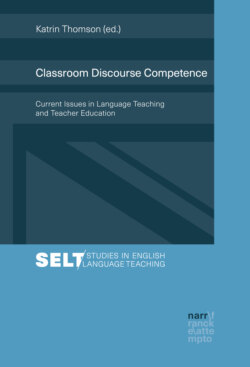Читать книгу Classroom Discourse Competence - Группа авторов - Страница 14
На сайте Литреса книга снята с продажи.
2.3 Recent Developments in Research and Teacher Education – Current Issues
ОглавлениеThe fact that FL teachers’ verbal actions in classroom contexts are closely linked to didactic and pedagogical principles has recently been given more attention in research. For instance, the ‘Profession-related Language Competence Profiles’ (Berufsspezifische Sprachkompetenzprofile für Lehrpersonen für Fremdsprachen, Kuster et al. 2014b), developed in a large-scale research project (2009–2013) in Switzerland, represent an enormously important contribution to this research field. In line with the position taken in this chapter and volume, these researchers also argue that foreign language teachers need to acquire specific language competences which partly differ significantly from everday language use:
Ein grundlegendes Merkmal des sprachlichen Handelns von Fremdsprachenlehrpersonen […] ist dessen Kopplung an ein didaktisches und pädagogisches Handeln im Kontext des schulischen Sprachenlernens. Die Verbindung von sprachlichem mit sprachdidaktischem und pädagogischen Handeln […] führt zu spezifischen Formen von Sprachhandlungen […]. Als didaktische Sprachhandlung wird in diesem Zusammenhang eine Sprachhandlung bezeichnet, die mit einem bestimmten didaktischen Ziel verbunden ist, also darauf abzielt, etwas zu lehren, einen Lernprozess in Gang zu setzen, einen Prozess zu moderieren, zu stützen usw. Diese Sprachhandlungen erfordern von den Lehrpersonen spezifische Kompetenzen, die sich zum Teil deutlich vom alltagssprachlichen Sprachgebrauch unterscheiden. (Bleichenbacher et al. 2017: 13, emphasis in the original)4
Drawing on important reference documents such as the CEFR and EPOSTL,5 these profiles minutely define and describe “the communication-oriented linguistic skills required by teachers of foreign languages […] in order to practice their profession” in the context of primary and lower secondary school education (Kuster et al. 2014a: 2). The researchers distinguish between “five professionally relevant areas of language-related activity” (sprachliche Handlungsfelder von Fremdsprachenlehrpersonen): 1. preparing lessons, 2. conducting lessons, 3. assessing, giving feedback and advising, 4. establishing external contacts, 5. learning and further training (ibid.: 3).6 For each of these areas, a variety of teachers’ ‘linguistic tasks’ (Sprachhandlungen) are specified in the form of can do- or rather “ability statements” (ibid.). These linguistic tasks, then, are categorized according to the different language skills involved, i.e. reading, listening, writing, spoken production, spoken interaction. For instance, area 2 (conducting a lesson) includes the following teacher tasks in the category of ‘spoken production’:
‘In the target language, the teacher is able to guide learners […] from one teaching sequence to the next.’
‘In the target language, the teacher is able to give clear oral working instructions during a lesson.’ (ibid.: 10, 9).
For the assessment and evaluation of these linguistic skills and competences, a comprehensive assessment tool was developed (2015–2016), consisting of a model which defines four different levels of teachers’ target language proficiency (Niveaubereiche): “Einstiegsniveau, Niveau ‘en route’, Praxisniveau, Expertenniveau”7 (Bleichenbacher et al. 2017). Undoubtedly, the merits of these detailed competence profiles and assessment tools lie in their practicability and explicit focus on “the practical, job-related use of language in foreign language teaching” (Kuster et al. 2014: 2), and they have certainly contributed a great deal to gaining a much deeper understanding of the complexity of teacher tasks in classroom discourse.
However, there are also certain limitations with regard to practical pre-service teacher education and the theoretical modelling of teachers’ professional classroom discourse competences: The multitude of ‘linguistic tasks’ described in the profiles does create a very differentiated picture of the ‘linguistic skills’ that foreign language teachers are supposed to master (‘ability statements’) and able to display. These documents, thus, are primarily outcome- and assessment-oriented. They do not, however, explicitly provide insights into the underlying cognitive prerequisites and dispositions (i.e. teachers’ knowledge, comprehension, awareness of the underlying concepts and rationale) required for developing these discourse skills in the first place. That is, the two examples cited above only indirectly suggest that (prospective) teachers actually need to acquire classroom discourse knowledge about the pedagogic functions and relevance of teachers’ competent transition management (example 1) or instruction-giving (example 2). Thus, with regard to pre-service teacher education one of the remaining challenges is to link such concrete ‘linguistic tasks’ to the underlying concepts, processes, theories, principles etc. they relate to; and to make such links transparent in a theoretical model of CDC, which in turn may serve as a conceptual framework not only for practical pre-service teacher education at university level but also for operationalization in empirical research, testing and competence assessment (Legutke/Schart 2016: 13).
